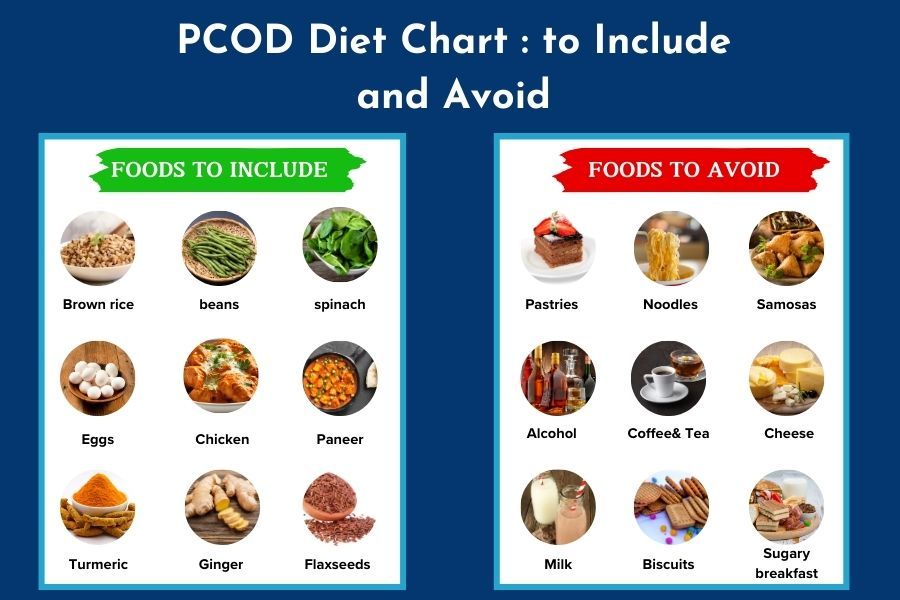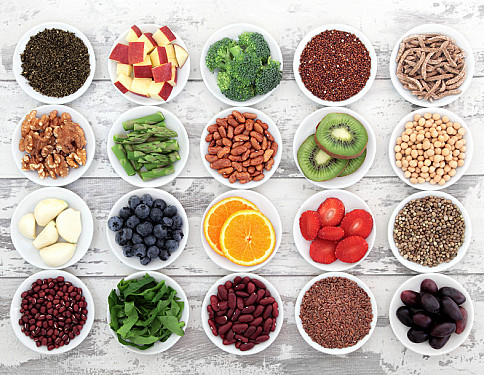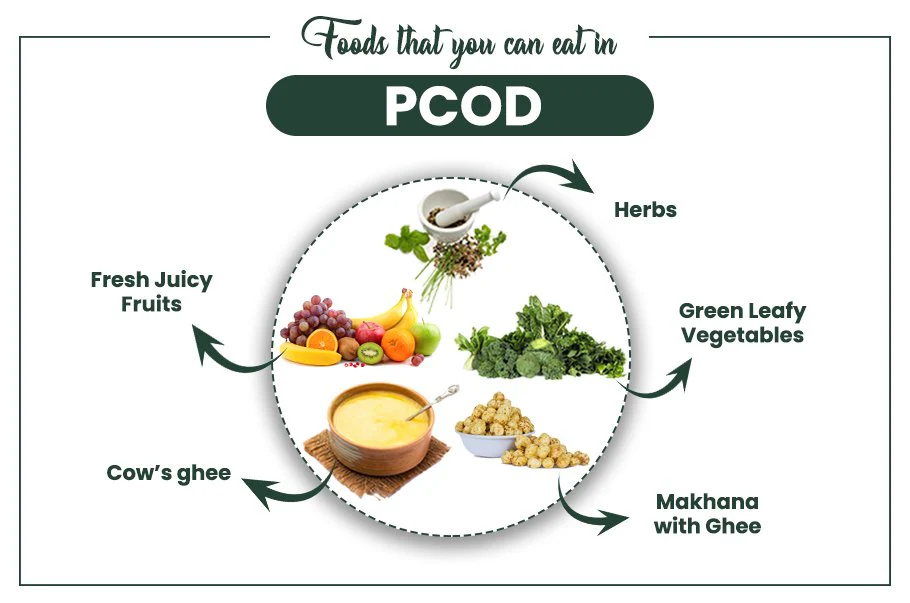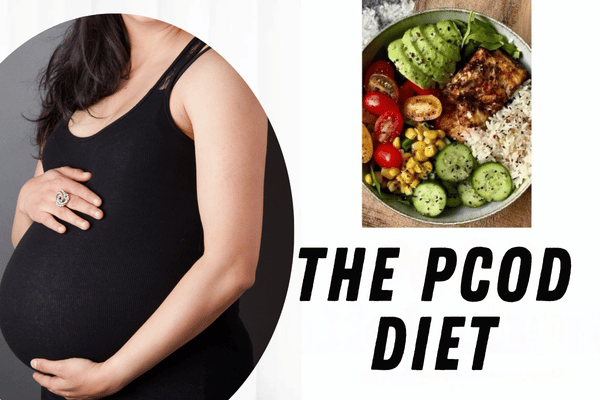Polycystic Ovarian Disease (PCOD) affects a significant number of women globally and is a leading cause of infertility. This condition is often marked by irregular periods, excessive androgen levels, and cysts in the ovaries. The impact of PCOD goes beyond physical health, affecting mental well-being and emotional health. One way to manage PCOD symptoms and improve fertility is through diet. A proper diet can help regulate hormones, improve insulin sensitivity, and promote overall reproductive health.
In this blog, we will explore the best foods to include in your diet for regulating hormones and improving fertility. You’ll discover how certain nutrients play a key role in managing PCOD and how to make informed dietary choices. By focusing on nutrient-rich foods, you can support your health and take charge of your PCOD journey.
Understanding PCOD and Its Impact on Fertility

Before diving into the specifics of the PCOD diet, it’s essential to understand the condition’s effects on fertility. Women with PCOD often experience hormonal imbalances, particularly elevated levels of insulin and androgens (male hormones). These imbalances can disrupt ovulation and make it harder to conceive.
One of the primary causes of infertility in PCOD is insulin resistance, where the body’s cells do not respond well to insulin. This leads to higher insulin levels, which in turn, stimulate the ovaries to produce more androgens. This imbalance can interfere with the normal growth and release of eggs from the ovaries.
Key Nutrients to Focus on for PCOD Management
Several nutrients have been shown to help manage PCOD symptoms and support fertility. Below are some of the key components to focus on:

1. Fiber-Rich Foods
- Why it’s important: Fiber helps in regulating insulin levels by slowing the absorption of sugar into the bloodstream. It also helps manage weight and improves digestive health.
- Top foods to include: Whole grains like oats, quinoa, and brown rice; fruits like apples, berries, and pears; vegetables like broccoli, spinach, and carrots.
- Additional Benefit: High-fiber foods can help you manage your weight, a key factor in controlling PCOD symptoms. Programs like Weight and Inch Loss Program can help incorporate these foods into your diet to maximize their benefits.
2. Healthy Fats
- Why it’s important: Healthy fats help regulate hormones and improve insulin sensitivity. They also support the body’s ability to absorb fat-soluble vitamins.
- Top foods to include: Avocados, nuts, seeds, and olive oil.
3. Lean Proteins
- Why it’s important: Proteins help stabilize blood sugar levels and support muscle health. A diet rich in lean proteins can promote weight management, which is important for women with PCOD.
- Top foods to include: Chicken breast, turkey, fish (especially fatty fish like salmon), tofu, and legumes.
- Additional Benefit: Consuming lean proteins helps in the Weight Gain Program if you’re struggling with low body weight or muscle mass, a common issue with PCOD.
4. Low-Glycemic Index (GI) Foods
- Why it’s important: Low-GI foods cause a slow and steady rise in blood sugar, preventing insulin spikes. This is particularly important for women with PCOD who may suffer from insulin resistance.
- Top foods to include: Sweet potatoes, legumes, non-starchy vegetables, and whole grains.
- Additional Benefit: A diet low in refined sugars and carbs can be a part of any Detox Program, helping cleanse the body and reduce inflammation associated with PCOD.
5. Antioxidant-Rich Foods
- Why it’s important: Antioxidants help combat oxidative stress and inflammation in the body, both of which are linked to PCOD. They also promote ovarian health.
- Top foods to include: Berries, leafy greens, nuts, and seeds.
- Additional Benefit: Antioxidant-rich foods can also be beneficial for hair health. If you’re struggling with hair loss due to PCOD, incorporating these foods can complement your Hair Fall Control program.
6. Vitamin D
- Why it’s important: Low levels of vitamin D have been linked to PCOD. It helps regulate insulin and can improve ovarian function and fertility.
- Top foods to include: Fatty fish (salmon, mackerel), fortified dairy products, and egg yolks. If you’re not able to get enough from food, a vitamin D supplement may be necessary.
7. Chromium-Rich Foods
- Why it’s important: Chromium helps improve insulin sensitivity, which is crucial for managing PCOD symptoms.
- Top foods to include: Broccoli, tomatoes, and whole grains.
Incorporating These Foods Into Your Daily Diet

When planning your meals, it’s important to balance these nutrients and create a diet plan that supports your specific health needs. Here’s how you can incorporate these foods into your daily meals:
Breakfast Ideas:
- Oats porridge with chia seeds, berries, and a drizzle of honey.
- Smoothie with spinach, flax seeds, almond milk, and a handful of berries.
Lunch Ideas:
- Grilled chicken salad with leafy greens, avocado, and a handful of seeds.
- Quinoa bowl with mixed vegetables, olive oil, and a source of lean protein like chickpeas.
Dinner Ideas:
- Grilled salmon with steamed broccoli and sweet potato.
- Stir-fried tofu with bell peppers, spinach, and a side of brown rice.
PCOD and Fertility: How Diet Plays a Role

Maintaining a balanced diet can significantly improve fertility in women with PCOD. A nutrient-rich diet can help balance hormones, promote ovulation, and improve insulin sensitivity, which are all crucial factors for conception.
For women with PCOD, eating the right foods can help regulate the menstrual cycle, increase the chances of ovulation, and improve the overall quality of eggs. Along with medical treatment, diet plays a key role in enhancing fertility.
In addition to dietary changes, engaging in wellness programs like Sport Nutrition and Right Exercise For You can further optimize fertility. Exercise not only supports weight management but also helps balance insulin and improve overall reproductive health.
Lifestyle Changes for PCOD Management
In addition to a balanced diet, lifestyle changes like regular exercise, stress management, and getting adequate sleep are essential for managing PCOD symptoms. Exercise helps with weight management, which is important for reducing insulin resistance and improving hormonal balance. Stress management techniques like yoga and meditation can also help reduce the impact of stress hormones on fertility.
Consulting a Nutritionist for PCOD Management
While dietary changes can make a significant difference, it’s always a good idea to consult a nutritionist who specializes in PCOD management. A nutritionist can help create a personalized diet plan that caters to your specific needs, helping you navigate your PCOD journey with ease.
Deepak KD, a practicing nutritionist and consultant, works with a wide range of health issues, including diabetes, hypertension, obesity, and PCOD. With her guidance, you can get a tailored nutrition plan that supports your fertility goals and improves overall health.
Consult her at:
D’FAB U Thane
Kabra Galaxy, Brahmand, Thane, India
FAQs
- Can a PCOD diet help with fertility?
Yes, a balanced diet rich in fiber, healthy fats, and proteins can help regulate hormones and improve fertility in women with PCOD. - What is the role of insulin in PCOD?
High levels of insulin in women with PCOD can cause an imbalance in hormones, leading to ovulation issues. A diet that supports insulin sensitivity can help manage this. - Can weight loss improve PCOD symptoms?
Yes, losing weight can help reduce insulin resistance and improve the balance of hormones in women with PCOD, potentially improving fertility. - What foods should be avoided with PCOD?
Processed foods, sugary snacks, and high-carb foods can worsen insulin resistance and should be limited in the diet. - How long will it take to see results from a PCOD-friendly diet?
Results vary from person to person, but many women see improvements in their menstrual cycles and overall health within 3 to 6 months of following a balanced diet.
Conclusion
A well-rounded, nutrient-dense diet is crucial for managing PCOD and improving fertility. By focusing on fiber, healthy fats, lean proteins, and low-GI foods, you can regulate your hormones, improve insulin sensitivity, and enhance your reproductive health. Remember, making dietary changes is just one aspect of managing PCOD—lifestyle changes and professional guidance also play key roles in achieving long-term health benefits.
If you’re dealing with PCOD, consider consulting with a nutritionist who can help you create a personalized plan for managing the condition and improving fertility. Taking control of your health starts with the right choices, and every step you take brings you closer to your goals.

